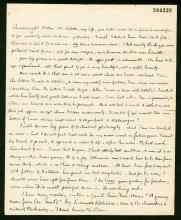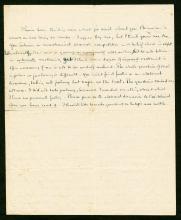BRACERS Record Detail for 19349
To access the original letter, email the Russell Archives.
"Thursday night"
"When I was in love with Ottoline I couldn't write her half such good letters as I write now. I am best when I am impersonal, and when one loves one wants to be personal."
There are two transcriptions of this letter with some text changes: document .052436, record 99904; document .201137, record 116373. Both begin with the section of document .200337, record 19348 written on Thursday morning. Both transcriptions vary from the text of this letter in the same way: the words "Sinn Fein" do not appear; "unrestrained sexual competition" becomes "unrestrained freedom" and several words after that change are omitted. The latter transcription contains one annotation in Colette's hand.
BR encloses (not present) "an abstract discussion" on the passions. C19.04.
Letter 79
BR TO CONSTANCE MALLESON, 22 AUG. 1918
BRACERS 19349. AL. McMaster
Previous Brixton letter, BRACERS 19348; next letter, BRACERS 81177
Edited by K. Blackwell, A. Bone, N. Griffin and S. Turcon
<Brixton Prison>1
Thursday night 22 Aug. ’18.
Colette, my Life, your letter2 was so infinitely wonderful — and you yourself were so divine yesterday.3 I wish I didn’t have these black fits — they are a kind of madness. No trace remains now. I did really think you were probably tired of me — not for any reason, only because the idea was horrible.
Your big picture is a great delight — the upper part is admirable — the hair and the eye and forehead — all that part of you is very beautiful, with a noble beauty.
How cruel it is that one is at one’s worst where one loves — at least I am. The letters I write to Ottoline, and even my weekly manifestoes,4 I am sure are more interesting than the letters I write to you. When I was in love with Ottoline I couldn’t write her half such good letters as I write now. I am best when I am impersonal,5 and when one loves one wants to be personal. And all that is mad and violent in me does not appear except where I care enormously. I wonder if you would like me better if I were always impressive and dignified and statuesque?
I will do one big piece of technical philosophy6 — what I am embarked on now — but I do not feel that will be my main work in future years. I want to teach and preach, and spread a view of life — after the war. My best work lies ahead of me — I owe that to you. I had utterly lost ambition, and now it is as strong as when I was young. It is a joy. Otherwise one’s work has to be done from mere duty, which is a thin and tiring motive. — At last I am free in my soul. Old fetters of tradition hampered me till very lately — but for the war, I should never have got free from them. I do love your feeling for freedom, even when it is most painful to me in its working out.
I have been reading rather a good Sinn Fein story: A young man from the South by Lennox Robinson.7 One of the characters is evidently Markievicz8 — I don’t know the others.
I have been thinking over what you said about your American’s views on sex being so crude.9 I agree they are; but I think yours are too. You believe in unrestrained sexual competition — a belief which is right but naturally, when one is young and unusually attractive, tho’ I do not believe in outward restraints, yet I think some degree of inward restraint is often necessary if one is not to be unduly unkind.a The whole question of such impulses as jealousy is difficult. You will find further on an abstract discussion,10 taking not jealousy but rage as the text. The questions raised are not easy. I did not take jealousy, because I wanted something about which I have no personal feeling. Please pass on the abstract discussion to Miss Wrinch when you have read it. I should like to make your views on the topic more subtle.
- 1
[document] The letter was edited from the unsigned, thrice-folded single sheet in BR’s hand in the Malleson papers in the Russell Archives.
- 2
your letter Possibly her letter of 19 August 1918 (BRACERS 113151), in which she urges him to resist the blackness swallowing him up.
- 3
- 4
my weekly manifestoes Parts of some Brixton letters, rarely identifiable, were extracted and circulated by Rinder to his friends as what he here called “manifestoes”, or (in Letter 81) “public letters”.
- 5
I am best when I am impersonal Impersonality was a quality that BR valued not only in his ethics but also in his philosophical writing. On 22 February 1946 (BRACERS 56417), with his marriage to Peter falling apart, he wrote to his friend Gamel Brenan: “She tries to imprison me in a round of petty personal emotions and is furious when I think about impersonal things. I won’t submit to it any more.”
- 6
one big piece of technical philosophy The big book did not come to fruition because BR did not return to Cambridge after his release (he was invited back in 1919) but became involved in other projects as well as travelling to Russia and China. However, his philosophy of neutral monism, which he was developing at this time, did appear in “On Propositions” (1919) and The Analysis of Mind (1921).
- 7
a good Sinn Fein story ... Robinson Esmé Stuart Lennox Robinson (1886–1958), Irish playwright and theatrical producer, director of Dublin’s famous Abbey Theatre. A Young Man from the South, a novel, was published in 1917.
- 8
evidently Markievicz Constance Gore-Booth (1868–1927), an Irish republican who married a Polish count, Casimir Dunin Markievicz. In December 1918, she was the first woman elected to the British House of Commons but, along with all other Sinn Fein M.P.s, did not take her seat.
- 9
your American’s views on sex being so crudeColette had written in her letter of 20–21 August 1918: “He [Colonel J. Mitchell] is decent, just as I said, but it’s a somewhat crude (?) old-fashioned (?) decency.” She goes on to explain that Mitchell told her he wouldn’t be having an affair with the young woman he was involved with if her husband were still alive, because she would be her husband’s property (BRACERS 113152). Mitchell was in the US army. Colette thought Mitchell may have been chief of staff for Major-General John Biddle, who commanded American troops in the UK in 1918 (After Ten Years [London: Cape, 1931], p. 127).
- 10
find further on an abstract discussion It was “On ‘Bad Passions’”, The Cambridge Magazine 8 (1 Feb. 1919): 359 (B&R C19.04); 19 in Papers 8. The manuscript, titled “Morality and Oppressive Impulses”, begins: “One of the most difficult problems before the moralist and the constructive sociologist is the treatment of impulses recognized as undesirable, such as anger, cruelty, envy, etc. These may be classed together as impulses which essentially (not only accidentally) involve the thwarting of the desires and impulses of others. Such oppressive impulses are often so deep and instinctive that a life in which they are simply thwarted will be felt to be as unsatisfying as (say) a life of celibacy. Moreover, they are liable, if thwarted, to break out with a violence all the greater owing to repression.” He concluded: “The impulsive life can be utterly transformed by physiological means.… [B]y stimulating or retarding the action of various glands, it would seem the character may be utterly changed. Such books as Cannon’s Bodily Changes in Pain, Hunger, Fear and Rage suggest immense possibilities in this direction” (Papers 8: 273, 275).
Textual Notes
- a
a belief which is right … inward restraint … unkind. This awkward sentence replaced “a belief which is natural when one is young and unusually attractive. I do not believe in outward restraints but I think some degree of inward restraint is often necessary if one is not to be unduly unkind.”


